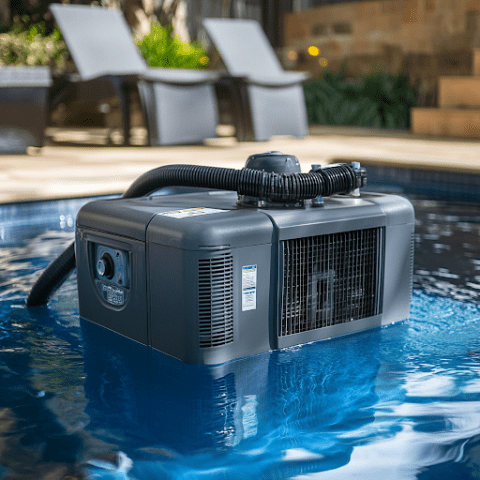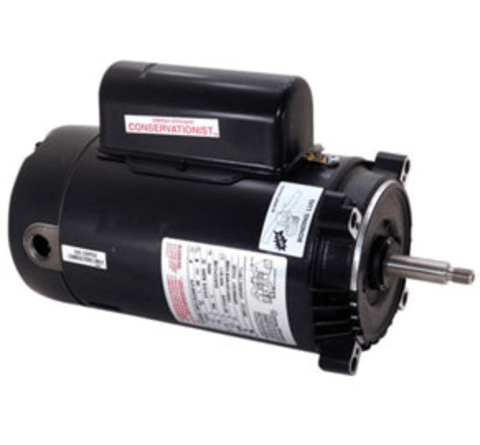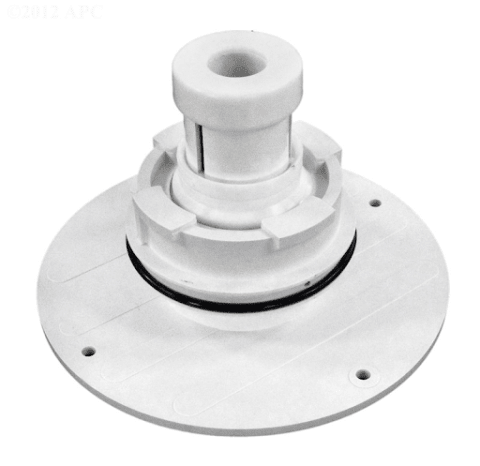1.5 HP vs 2 HP Pool Pump: Which One is Right for Your Pool?

One of the most vital elements in maintaining your pool is its pump. Think of the pool pump as the heart of your swimming pool. Just as the heart circulates blood throughout your body, the pool pump circulates water through the pool's filtration system, ensuring that the water remains clean and safe.
Selecting the right size and horsepower (HP) for your pool pump is crucial. It's not a one-size-fits-all situation. Imagine two different pool setups: a small, cozy backyard pool and a grand, resort-style pool. Naturally, the smaller pool will have very different pump requirements compared to the larger one. This decision impacts everything from the clarity of your pool water to your energy bills.
It's all about understanding your pool's unique size and type, the corresponding horsepower needs, and your budget. So, grab your favorite beverage, get comfortable, and let's dive into the fascinating world of pool pumps together. We'll start by exploring what a 1.5 HP pool pump setup entails and who it would be perfect for. Ready?
Understanding Pool Volume
A 1.5 HP pool pump is generally suitable for pools with a volume of 20,000 to 30,000 gallons. This range can vary based on factors like pool design, layout, and distance from equipment.

Example Calculation
Consider a simple rectangular pool measuring 33 feet long, 15 feet wide, and 6 feet deep. This pool has a volume of close to 30,000 gallons, making a 1.5 HP pump adequate for maintaining water circulation and cleanliness.
Complex Pool Features
If your pool includes features like waterfalls or spas or is far from pool equipment, a 1.5 HP pump might struggle. Your pool's specific features and circumstances will ultimately dictate the correct pump size.
Best Practices
Use the smallest pump that provides adequate water circulation to save on energy and costs while maintaining an efficient pool system.
General Guidelines
A 2 HP pump can handle pools with 35,000 to 45,000 gallons. However, these figures can vary based on environmental specifics and the desired turnover rate.

Example Scenario
A 2 HP pump might be necessary to handle the increased workload in a pool with around 30,000 gallons and additional features like waterfalls or in-floor cleaning systems.
Plumbing Considerations
Ensure your pool's plumbing system is compatible with the pump's power. For a 2 HP pump, a plumbing system with 2.5" piping is typically a good match.
Choose a 2 HP pool pump for larger pools, pools with additional features, or when the plumbing system can handle the increased flow.
Large Pools
For pools over 30,000 gallons, a 2 HP pump can circulate and filter water more efficiently.
Inground Pools With Deep Ends
A 2 HP pump is beneficial for pools with varying depths, especially those with deep ends, as it effectively circulates water.
Pools with Additional Features
Features like water slides, fountains, or attached spas require a stronger pump. A 2 HP pump can handle the extra pressure needed.
Built-in Cleaning Systems
Pools with in-floor cleaning systems often need a 2 HP pump to provide the required high-pressure water flow.

Complex Plumbing Runs
Long pipe runs or numerous bends in the plumbing system may necessitate a more powerful pump to compensate for extra resistance.
Frequent Pool Parties
If your pool is heavily used, a 2 HP pump can quickly filter out contaminants, maintaining a clean environment.
Important Note
A larger pump isn't always better. For small or medium pools without complex features, a 2 HP pump could be overkill, leading to unnecessary energy costs and strain on the pool system.
To determine the horsepower requirements of a pool pump, consider the following key factors:
Pool volume: Calculate your pool's total water volume in gallons.
Desired turnover rate: Aim to cycle all pool water through the pump and filter system within 8-10 hours.
Flow rate: Determine the required gallons per minute (GPM) by dividing pool volume by turnover time in minutes.
Pipe diameter: Consider your pool's plumbing size, as it affects the maximum flow rate.
Filter compatibility: Ensure the pump's GPM doesn't exceed the filter's maximum flow rate.
Additional features: Account for water features like waterfalls or spas that may require higher horsepower.
Determine pool volume (e.g., 20,000 gallons)
Divide by desired turnover time (e.g., 600 minutes for 10 hours)
Result is required GPM (e.g., 33 GPM)
Choose a pump that meets your GPM requirements while considering energy efficiency. Due to federal efficiency standards, variable-speed pumps are now required for pumps greater than 1.0 Total Horsepower (THP).
Remember, balancing pool size, pump power, and energy usage is crucial. Aim for sufficient power to maintain a clean pool without unnecessarily increasing energy costs.
Choosing the right pool pump is like finding the perfect pair of shoes - it needs to fit just right! Let's break it down by pool size:
Cozy Pools (Up to 10,000 gallons)
For these petite pools, a 1 to 1.5-horsepower pump is usually the sweet spot. It's like having a peppy little sports car - just enough oomph to get the job done without going overboard.
Middle-of-the-Road Pools (10,000 to 20,000 gallons)
These pools are the Goldilocks of the bunch - not too big, not too small. A 1.5 horsepower pump is often just right, but you might want to step up to 2 horsepower if your pool has some fancy features or the pump is far from the pool.
Big Kahuna Pools (Over 20,000 gallons)
For these aquatic giants, you'll want to bring out the big guns. A 2 horsepower pump is usually up to the task, providing enough muscle to keep all that water moving and grooving.
But remember, choosing a pool pump isn't just about size - it's like solving a fun puzzle! You'll need to consider things like:
1. Your pool's plumbing (is it more spaghetti or linguine?)
2. The distance between your pool and pump (is it a short jog or a marathon?)
3. Any extra pool features (waterfalls, hot tubs, or other aquatic bells and whistles)
So, while these guidelines are a great starting point, your perfect pump might be a bit different. It's always best to consult with a pool pro to find your ideal match. Happy pumping!
Let's dive into the world of pool pumps and make a splash with the right horsepower for your aquatic paradise!
In-Ground Pools: The Big Leagues
In-ground pools are like the varsity team of the pool world. They're usually bigger and have more complex plumbing, so they need a pump with some serious muscle. For most in-ground pools, a 1.5 HP to 2 HP pump is the sweet spot.
For example: You've got a standard 20,000-gallon in-ground pool. There are no fancy bells and whistles, just a classic swimming spot. A 1.5 HP pump would be your go-to choice, keeping your water crystal clear and perfectly circulated.
But wait! If you're rocking an Olympic-sized pool or hosting daily pool parties, you might want to level up to a 2 HP pump or higher. It's all about matching the pump to your pool's personality.
Above-Ground Pools: The Compact Contenders
Above-ground pools are like the nimble point guards of the pool world. Because they're smaller and have simpler plumbing, they don't need as much horsepower. For most above-ground pools, a 1 HP pump is the perfect fit. Some smaller pools can even get by with a 0.75 HP pump.
Imagine you've got a round above-ground pool, 24 feet across and about 5 feet deep. This pool holds around 13,500 gallons of water. A 1 HP pump would be your pool's new best friend, keeping the water moving and grooving.

The Wild Cards: Special Features
Now, if your pool has some extra pizzazz, like waterfalls or built-in cleaning systems, you might need to adjust your horsepower game plan. These features can be thirsty for more power.
Remember, these are just general guidelines. Every pool is unique, like a fingerprint made of water. For the perfect match, it's always a good idea to chat with a pool pro or check out the pump manufacturer's recommendations.
So there you have it! Whether you're working with an in-ground giant or an above-ground gem, now you're ready to pick the perfect pump and keep your pool party going strong!
When it comes to picking a pool pump, size matters. Choosing between an oversized or undersized pump can significantly affect your pool's performance, efficiency, and energy costs. Let's examine the pros and cons of each to help you make the best decision.
More Power
An oversized pump packs a punch. It can cycle water through your pool and filtration system quickly, making it ideal for situations where you need rapid cleaning, like before a big pool party. Think of it as having a powerful sports car that can get you to your destination in no time.
Higher Energy Consumption
However, this power comes at a cost. Larger pumps consume more energy, leading to higher electricity bills. They can also strain your pool’s filtration system, causing faster wear and tear. It's like using that sports car for daily commuting—impressive but not budget-friendly in the long run.
More Energy-Efficient
Undersized pumps are the energy savers. They consume less power, which means lower electricity bills. For example, a 1.5hp pump uses noticeably less energy than a 2hp pump, making it a more economical choice over time.
Takes Longer to Clean Your Pool
The downside? It takes longer to clean your pool. If you have a large pool and frequent swimmers, this could lead to issues like bacterial buildup or algae growth due to inadequate filtration. But if you only swim on weekends, this might not be a big deal.
Finding the Perfect Fit
The key is to balance the pump size with your pool’s needs. Consider your pool size and how often it’s used. The 'Goldilocks' approach—choosing a pump that's just right—ensures efficient performance, optimal cleanliness, and energy savings.
The size of your pool piping is another crucial factor. It directly impacts the efficiency of your pump.
Pipe Diameter for 1.5 HP Pool Pump
A 1.5 HP pump works best with a 1.5" to 2" pipe diameter. This size encourages good flow rates without significant resistance, allowing the pump to operate smoothly.
Pipe Diameter for 2 HP Pool Pump
For a 2 HP pump, you’ll need larger pipes, typically between 2" to 2.5" in diameter. This accommodates the higher water output, ensuring efficient and quick water movement through your pool system.
Choosing the right pool pump and piping size requires some homework. Consider factors like the distance from the pump to the pool and the number of turns in the piping system. For instance, if your pool is 50 feet away from the pump, you might need larger pipes, even with a 1.5 HP pump, to maintain efficiency.
In summary, the right-sized pump and proper piping can make all the difference in maintaining an efficient, clean, and cost-effective pool.
Cost is a key factor when choosing a pool pump. Generally, a 1.5 HP pump will set you back between $150 and $600, while a 2 HP pump can cost anywhere from $200 to over $800. At first glance, the 1.5 HP option seems more wallet-friendly. However, it's vital to look beyond just the price tag.
Imagine opting for a budget 1.5 HP pump priced at $200. If it’s not powerful enough for your pool, it’ll need to run longer to keep the water clean, leading to higher energy bills. You might even find yourself replacing it sooner than expected due to wear and tear.
Now, consider investing in a premium 2 HP pump for around $800. While the upfront cost is higher, if it matches your pool's size and needs, it will operate efficiently, potentially saving you money in the long run. Plus, these pumps often come with longer warranties and require less maintenance, giving you peace of mind.
In summary, while the initial cost of a 1.5 HP pump is lower, factors like energy efficiency, pool size, and pump quality should guide your decision.
Many believe that higher HP pumps consume a lot of energy. While they do use more power, the difference isn’t as drastic as you might think. The key is how efficiently they operate.
Pool pumps use energy to move water, so a 2 HP pump that does the job quickly may actually save you energy. A typical 1.5 HP pump uses about 1500-2000 watts per hour, while a 2 HP pump consumes around 2000-2500 watts.
This translates to a difference of about 500 watts per hour. Over a six-month pool season, running the pump for eight hours daily could result in a difference of roughly 720 kilowatt-hours (kWh). Given that the average electricity cost is about 13.19 cents per kWh, this could mean an extra $95 in energy costs for the 2 HP pump.
While larger pumps do use more energy, their efficiency can justify the consumption if they meet your pool's needs. In many cases, a 1.5 HP pump can still provide excellent performance while keeping your energy costs down.
Choosing between a 1.5 HP and a 2 HP pool pump can feel like a challenge, but understanding your specific pool needs can simplify the decision. While a 1.5 HP pump is often sufficient for most residential pools, a 2 HP pump may offer enhanced performance for larger or more demanding setups.
Ultimately, the right choice hinges on factors such as pool size, plumbing configuration, and energy efficiency considerations. By carefully evaluating these elements, you can ensure that your investment not only meets your pool's requirements but also contributes to a more enjoyable swimming experience for years to come.
I’m excited to share more insider tips and exclusive savings with you! By subscribing to our email newsletter, you’ll receive essential pool care advice and unique money-saving offers, all aimed at helping you achieve the most sparkling and inviting pool in the neighborhood. Don’t miss out—join our growing community today and simplify your pool maintenance!

